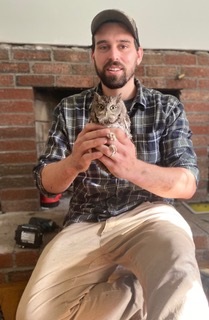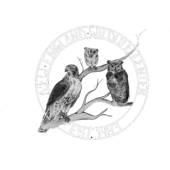
This time of year when we hear footsteps on the rooftop and noises in our chimney we get very excited because we think Santa Claus is coming to visit and leave us presents under our tree. Sometimes that happens if we have been very, very, good, but most often it is wildlife looking for a warm place to take a long winter’s nap.
At Cape Wildlife Center we are brought many different species that have been trapped in chimneys, sometimes for lengthy periods of times. Any animal that can fly over a house or climb up the side of a house runs the risk of intentionally or unintentionally falling into a chimney. If it is the Springtime, they may come to look for a safe, protected, place to raise their family. Many species of birds will do this including chimney swifts. If the chimney is not in use, the homeowner may be unaware until they hear the peeping of the chicks. Most times these birds are able to escape on their own when it is time to leave unless the nest falls further down the chimney. If the flue is closed the bird will drop onto the flue and can sometimes be injured. If the mother can’t access them they become dehydrated and can die. If the flue is open, they land into your fireplace and either lie there injured or attempt to fly around your house. This year we removed a Northern Flicker and an Eastern Screech Owl from chimneys. Both were able to be released. They were sooty, dehydrated and stunned but did well under our care.
Mammals also love warm, dark places like a nice brick chimney. Bats, raccoons, mice, grey squirrels and flying squirrels are some of the mammals we have taken in from chimneys. If you have a raccoon or a bat in your chimney and it can’t get out on its own, you need to call a professional pest agency removal service. Both of those animals can carry rabies. They will become agitated when being captured and will bite and scratch, and possibly escape into your home. Trust me, you do not want an angry, frightened raccoon in your hands or running around your house. Squirrels do not carry rabies, but they can still give you a nasty bite, and also are not fun when running around your home after they escape from your arms. If an animal has dropped into the fireplace area, the trick is capturing it before it escapes while not getting bit. You must be quick, agile, and fearless. Most chimney rescues are a job best left to the professionals.
Once the animal is safely captured, we are more than happy to evaluate it, treat it and rehabilitate it if that is possible. Animals can live in chimneys a surprisingly long time, but do become emaciated and dehydrated. It is best to call someone to help early on for the best chance of saving the animals’ life and also not have a smell of decay in your home.
Prevention is the best way to keep wildlife out of your chimney. Every chimney should have a secure chimney cap installed. This also prevents other debris from getting down your chimney, but Santa is able to pass right through it. No worries there. Also have your chimney checked and cleaned on a regular basis. You want to make sure there is nothing (like a dead animal or nesting material) blocking the way before you light that first fire of the season. Nothing is a bigger mood killer than the smell of something roasting in your chimney.
If you want to make sure Santa comes down your chimney with presents, you need to be very, very good. Be kind to all animals. Protect and care for them individually and as a species. Be kind to Mother Earth. Keep her clean and healthy. Support your local wildlife organizations and help in their mission to care for injured, abandoned and orphaned wildlife. Support federal and state legislature protecting wildlife and conservation. If you do these things, Santa will be good to you this year. And even if he isn’t, you will be rewarded by having the world a better place to live.
To learn more about the Cape Wildlife Center or help in their mission, visit www.capewildlifecenter.com or call 508 362-0111.
Caryn Ritchie is on staff at the Cape Wildlife Center and holds both a Massachusetts wildlife rehabilitator’s license and a federal permit to rehabilitate migratory birds.

Recent Comments